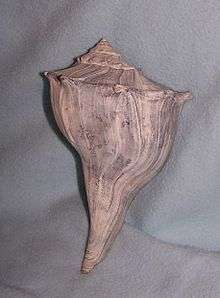Sinistrofulgur perversum
| Sinistrofulgur perversum | |
|---|---|
 | |
| Sinistrofulgur perversum found in France, with the operculum in place | |
| Scientific classification | |
| Kingdom: | Animalia |
| Phylum: | Mollusca |
| Class: | Gastropoda |
| (unranked): | clade Caenogastropoda clade Hypsogastropoda clade Neogastropoda |
| Superfamily: | Buccinoidea |
| Family: | Busyconidae |
| Genus: | Sinistrofulgur |
| Species: | S. perversum |
| Binomial name | |
| Sinistrofulgur perversum (Linnaeus, 1758) | |
| Synonyms | |
| |
The lightning whelk, scientific name Sinistrofulgur perversum,[1] is an edible species of very large predatory sea snail or whelk, a marine gastropod mollusc in the family Busyconidae, the busycon whelks. This species has a left-handed or sinistral shell. It eats mostly bivalves.
There has been some disagreement about the correct scientific name for this species, which has been confused with Sinistrofulgur sinistrum Hollister, 1958, and Busycon contrarium (Conrad, 1840), which is an exclusively fossil species.[1][2]
Distribution

This marine species is native to southeastern North America, south to Florida and the Gulf states.
Habitat
Lightning whelks can be found in the sandy or muddy substrate of shallow embayments.
Life habits
This whelk species feeds primarily on marine bivalves, ingesting their soft parts using its proboscis.
Sinistrofulgur perversum and Busycon carica
This species shares many characteristics with another species, the knobbed whelk Busycon carica, but there are some important differences:
- Lightning whelks are sinistral in coiling, whereas knobbed whelks are dextral
- Lightning whelks have a lower spire than the knobbed whelk
- The knobs of the lightning whelk are usually less well-developed than those of the knobbed whelk
- Lightning whelks are diurnal, while knobbed whelks are active both day and night
- Lightning whelks prefer to stay in deeper waters than the knobbed whelks when feeding on mud flats

.jpg)
Human use
For thousands of years Native Americans used these animals as food, and used their shells for tools, ornaments, containers and to make jewelry, i.e. shell gorgets.[3] They may have believed the sinistral nature of the lightning whelk shell made it a sacred object.
The lightning whelk is the State Shell of Texas.
References
- 1 2 J. Wise, M. G. Harasewych, R. T. Dillon Jr. (2004). Population divergence in the sinistral whelks of North America, with special reference to the east Florida ecotone (PDF; 673 kB). Marine Biology 145, pp. 1167–1179.
- ↑ Sartori, A. (2014). Busycon contrarium (Conrad, 1840). World Register of Marine Species. Accessed on 2014-06-06
- ↑ Starr F. 1897. A Shell Gorget from Mexico. Proceeding Davenport Academy of Natural Sciences, volume VI. 173-178.
- Marquardt, W.M. 1992 Shell Artifacts from the Caloosahatchee Area. In Culture and Environment in the Domain of the Calusa, edited by W. H. Marquardt, pp. 191–228. Institute of Archaeology and Paleoenvironmental Studies, Monograph 1. University of Florida, Gainesville.
- Paine, Robert T. 1962 Ecological Diversification in Sympatric Gastropods of the Genus Busycon. Evolution 16(4):515-523.
- Pulley, T.E. 1959 Busycon perversum (Linné) and some related species. Rice Institute Pamphlet, 46:70-89.
- Wise, J.B., G. Harasewych, & R. Dillon. 2004. Population divergence in the sinistral Busycon whelks of North America, with special reference to the east Florida ecotone. Marine Biology, 145:1163-1179; SMSFP Contrib.538.
External links
| Wikimedia Commons has media related to Sinistrofulgur perversum. |
- Georgia Department of Natural Resources, Snails of the Sea
- Texas Parks and Wildlife, lightning whelks